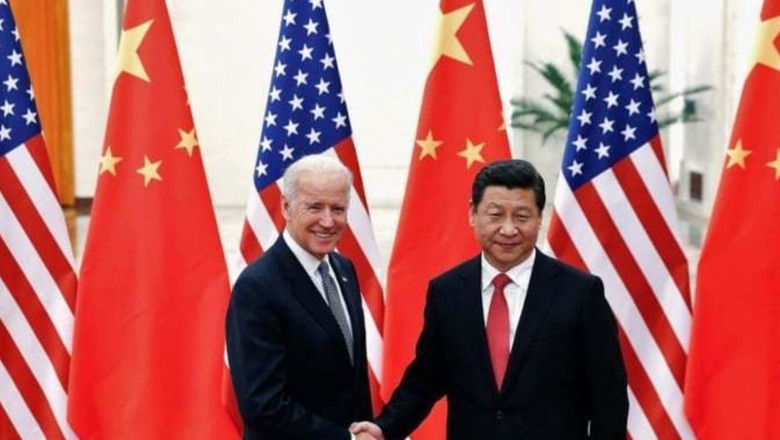
views
It is moot how opportune it was for President Biden to have pressed for a virtual meeting with President Xi at this juncture. What he hoped to achieve realistically is unclear, knowing the assumptions driving Xi’s policies, the consolidation of his power internally with his status elevated to that of Mao and Deng at the recent Plenum of the CCP and the virtual assurance of a third term for him as president at the next year’s Party Congress and, as against this, as others can see, the weakening of America’s position externally after the Afghanistan debacle and internally with a polarised country, a divided Democratic Party and Biden’s own declining popularity in polls.
Biden was not engaging Xi from a position of strength despite steps to build transatlantic unity, rebuild confidence with allies in Asia, signal higher political, diplomatic and military outreach to Taiwan, strategically bolster Australia’s maritime power through the AUKUS defence pact with Australia and the UK and a readiness for “extreme competition” with China.
The meeting was no doubt preceded by preparatory contacts between the two sides, the most recent being between Secretary of State Blinken and Chinese Foreign Minister Wang Yi at the G20 meet at Rome end-October and the earlier meeting between National Security Adviser Jake Sullivan and the Chinese Communist Party’s foreign affairs chief Yang Jiechi at Zurich on October 6.
The issues of concern to both sides have been publicly aired by them, and the differences have been open and sharp. The US has been vocal on human rights and freedoms in Xinjiang, Tibet and Hong Kong, expressing concerns about cyber attacks, economic coercion of allies, China’s conduct in the East and South China Seas and across the Taiwan Strait, stealing technology, unfair trade practices and unwillingness to cooperate with WHO on identifying Covid-19’s origins etc. All these accusations and complaints have been stingingly dismissed by the Chinese side, as we saw at the Alaska meeting in March this year between Blinken and Yang Jiechi. On the face of it, finding common ground, defusing tensions and stabilising ties would not have seemed easy or even possible given the open challenge by China to the US power across geographies and domains.
A Replay of Alaska Summit
Yet, Biden seemed to be keen on having this meeting to establish guardrails to prevent the relations from veering into a conflict. That the US, as the stronger power, should show more nervousness about a potential conflict and look for a modus vivendi places it already in a weaker position psychologically vis-a-vis China. The Chinese would read it as America’s lack of appetite to enter into a conflict with China, especially after Afghanistan and wanting time to rebuild America’s internal strength and its alliances to confront Beijing. Biden, Blinken and others have publicly referred to going into meetings with China with strengthened hands after reinvigorating ties with allies etc. This has not impressed Xi Jinping as the November 15/16 virtual meeting shows.
In essence, this meeting was a replay of the Blinken-Yang Jiechi meeting in March. It is now even more clear that Yang was reflecting Xi’s thinking and his hit-back approach was on instructions. Xi has exploited this exchange to further consolidate his leadership at home, bolster his strong man image and give confidence domestically that he can steer China to its manifest destiny in the face of the US challenge.
This explains why, as against the White House’s 426 word read-out of the talks, the Chinese read-out was 2770 words long. Xi was addressing his domestic audience primarily, not the international community. He wanted to demonstrate that he spoke to the American leader from a position of confidence and strength, spoke from an elevated level to give advice on how relations should be handled, placed the ball squarely in his court for resolving differences, spelt out to him the principles that the US must adhere to for stabilising the ties. There was no acceptance that China is answerable in any way for the tensions that have arisen. It is all America’s fault and it is for America to redress the situation. It is Emperor Xi of the Middle Kingdom speaking to a humbled America.
Biden, in the US read-out, spoke of managing the US-China competition responsibly, of standing up for its interests and values and ensuring the rules of the road along with allies and partners. He raised China’s practices in Xinjiang, Tibet, Hong Kong, its unfair trade and economic policies, the importance of a free and open Indo-Pacific, freedom of navigation and overflight, and while remaining committed to a “One China” policy and other agreements with China, expressed strong opposition to unilateral efforts to change the status quo on Taiwan. He underscored the importance of managing strategic risks and the need for common-sense guardrails to ensure that competition did not veer into conflict. Why Biden thought that this message that has been conveyed to China publicly many times earlier would change its conduct when reiterated in private and made public again is not clear.
Xi’s Warning to Biden
China’s read-out shows that Biden made little impression on Xi and did not deter him from going down the road he has chosen, with self-righteousness. Xi seems to believe in a China-US G2 for the next 50 years. The onus of managing the relationship lies on the US, with Xi hoping patronisingly that Biden will “demonstrate political leadership and steer America’s China policy back on track of reason and pragmatism”. No course correction is evidently required by China.
As is habitual with China, to avoid concrete exchanges, buy time and obfuscate issues, Xi laid out general principles that should guide China-US ties. These are always vague and can be interpreted by China as is opportune. Xi lays down three principles: One, mutual respect, which means respecting each other’s core interests and major concerns (these the Chinese describe unilaterally), keeping differences under control; two, peaceful coexistence—a throw back to the vocabulary of the Cold War; and three, win-win cooperation, a tired and now meaningless formula.
Xi identified four priority areas: One, acceptance that few problems can be solved without China-US cooperation, an invitation to the US to join China’s global initiatives (BRI?); two, promote common interests in the areas of economy, energy, mil-to-mil, law enforcement, education, science and technology, cyber, environmental protection. In other words, normalise ties without any change in China’s policies on the assumption that the US complaints in some of these areas are unfounded; three, the US should handle differences with China with prudence as China will defend its sovereignty, security and development (the onus for good behaviour is on the US); four, work together to safeguard a fair and equitable world order. Xi wanted Biden to prove through concrete actions that he was not seeking a new Cold War.
Xi warned Biden that China’s rise was an inevitable trend of history and any attempt to stop it would be rejected, adding dramatically that he would sacrifice his own well-being to meet people’s expectations and, besides, claiming risibly that “aggression or hegemony is not in the blood of the Chinese nation”, and that since the founding of the People’s Republic “China has never started a single war or conflict, and has never taken one inch of land from other countries”. This shows the depth of Xi’s pretence and political chicanery, and his uncompromising spirit, which has a lesson for India and all others with which China has territorial or maritime differences.
On Taiwan, he warned that moves by the Taiwan authorities and “the intention of some Americans to use Taiwan to contain China … are extremely dangerous, just like playing with fire” and those playing will get burnt. He asserted that Taiwan was part of China and complete reunification would be pursued and if red lines were crossed China would be compelled to take resolute measures.
He mocked Biden on democracy, which he said was not mass produced with a uniform model for everyone, adding that dismissing forms of democracy that are different from one’s own was in itself undemocratic. On trade ties, he cautioned against politicising economic and trade issues, asking the US to stop abusing the concept of national security to suppress Chinese businesses. In the background of the environmental destruction of Tibet, Xi declaimed amusingly that ecological conservation had become a household concept in China. He skirted the issue of further WHO investigations into the origins of Covid-19 by cautioning against politicisation of diseases.
To show to the Chinese public that Xi had obtained favourable commitments from the US without any concession, the Chinese read-out quoted Biden as saying that the US did not seek to change China’s system, the revitalisation of its alliances was not anti-China, the US had no intention to have a conflict with China, and that Biden reaffirmed the One China policy, that the US did not support Taiwan independence, and that it was willing to work with China on the basis of mutual respect and peaceful co-existence, increase communication, work to reduce misperception and handle differences constructively.
In short, the score card according to the Chinese read-out was Xi 10 and Biden 0. Even if this is an exaggeration, it still raises the question whether Biden obtained from this meeting what he might have hoped for. It does seem that Xi is overplaying his hand and convincing the US and others that containing him is the only option going ahead.
The author is Former Foreign Secretary. He was India’s Ambassador to Turkey, Egypt, France and Russia. The views expressed in this article are those of the author and do not represent the stand of this publication.
Read all the Latest Opinions here


















Comments
0 comment